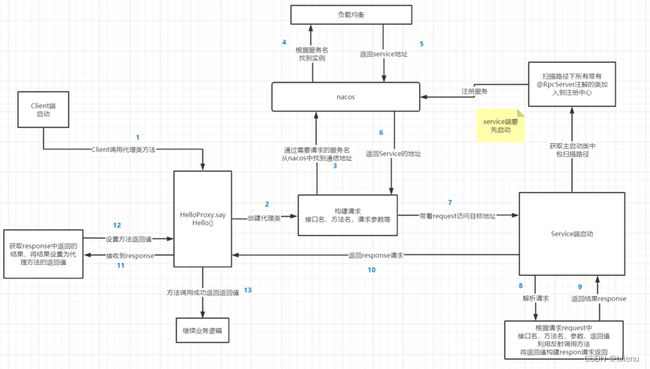用netty实现简易rpc
文章目录
- rpc介绍:
- rpc调用流程:
- 代码:
rpc介绍:
RPC是远程过程调用(Remote Procedure Call)的缩写形式。SAP系统RPC调用的原理其实很简单,有一些类似于三层构架的C/S系统,第三方的客户程序通过接口调用SAP内部的标准或自定义函数,获得函数返回的数据进行处理后显示或打印。
rpc调用流程:
代码:
public interface HelloService {
String hello(String msg);
}
public class HelloServiceImpl implements HelloService {
@Override
public String hello(String msg) {
System.out.println("读取到客户端信息:" + msg);
if (msg != null) {
return "已收到客户端信息【" + msg + "】";
} else {
return "已收到客户端信息";
}
}
}
public class NettyServerHandler extends ChannelInboundHandlerAdapter {
@Override
public void channelRead(ChannelHandlerContext ctx, Object msg) throws Exception {
// 接收客户端发送的信息,并调用服务
// 规定每次发送信息时 都以"HelloService#hello#开头“, 其中最后一个#后面的为参数
String message = msg.toString();
System.out.println("最初消息:" + message);
if (message.startsWith("HelloService#hello#")) {
String arg = message.substring(19);
System.out.println("接收的参数:" + arg);
String result = new HelloServiceImpl().hello(arg);
ctx.writeAndFlush(result);
}
}
@Override
public void exceptionCaught(ChannelHandlerContext ctx, Throwable cause) throws Exception {
// 出现异常时关闭通道
ctx.close();
}
}
public class NettyServer {
/**
* 启动服务
*
* @param host 主机地址
* @param port 线程端口
*/
private static void startServer0(String host, int port) {
EventLoopGroup bossGroup = new NioEventLoopGroup();
EventLoopGroup workerGroup = new NioEventLoopGroup();
try {
ServerBootstrap serverBootstrap = new ServerBootstrap();
serverBootstrap.group(bossGroup, workerGroup)
.channel(NioServerSocketChannel.class)
.childHandler(new ChannelInitializer<SocketChannel>() { // workerGroup
@Override
protected void initChannel(SocketChannel ch) throws Exception {
ChannelPipeline pipeline = ch.pipeline();
// String的编码解码器
pipeline.addLast(new StringEncoder());
pipeline.addLast(new StringDecoder());
pipeline.addLast(new NettyServerHandler()); // 自定义业务处理器
}
});
// 绑定端口并启动
ChannelFuture channelFuture = serverBootstrap.bind(host, port).sync();
System.out.println("服务器启动:");
// 监听关闭
channelFuture.channel().closeFuture().sync();
} catch (InterruptedException e) {
throw new RuntimeException(e);
} finally {
bossGroup.shutdownGracefully();
workerGroup.shutdownGracefully();
}
}
public static void startServer(String host, int port) {
startServer0(host, port);
}
}
public class NettyClientHandler extends ChannelInboundHandlerAdapter implements Callable {
private ChannelHandlerContext channelHandlerContext;
private String result; // 服务端返回的数据
private String param; // 客户端调用方法时传入的参数
/**
* 与服务器建立连接时被调用
*
* @param ctx
* @throws Exception
*/
@Override
public void channelActive(ChannelHandlerContext ctx) throws Exception {
System.out.println("channelActive 被调用");
this.channelHandlerContext = ctx;
}
/**
* 收到服务器数据时被调用
*
* @param ctx
* @param msg
* @throws Exception
*/
@Override
public synchronized void channelRead(ChannelHandlerContext ctx, Object msg) throws Exception {
System.out.println(" channelRead 被调用 ");
result = msg.toString();
// 唤醒等待的线程。
notifyAll();
}
@Override
public void exceptionCaught(ChannelHandlerContext ctx, Throwable cause) throws Exception {
ctx.close();
}
/**
* 当某个线程执行NettyClientHandler任务时,会调用get()方法,get()方法会阻塞当前线程,
* 直到任务执行完成并返回结果或抛出异常。
*
* @return
* @throws Exception
*/
@Override
public synchronized Object call() throws Exception {
System.out.println("call--1 ");
channelHandlerContext.writeAndFlush(param);
// TimeUnit.MILLISECONDS.sleep(5 * 1000);
wait(); // 等待channelRead()方法的调用
System.out.println("call--2 ");
return result;
}
/**
* 设置参数
*
* @param param
*/
public void setParam(String param) {
this.param = param;
}
}
public class NettyClient {
// 设置为cpu核数个线程
private static ExecutorService executorService = Executors.newFixedThreadPool(Runtime.getRuntime().availableProcessors());
private static NettyClientHandler nettyClientHandler;
private static void initClient() {
nettyClientHandler = new NettyClientHandler();
EventLoopGroup group = new NioEventLoopGroup();
Bootstrap bootstrap = new Bootstrap();
bootstrap.group(group)
.channel(NioSocketChannel.class)
.option(ChannelOption.TCP_NODELAY, true) // tcp无延迟
.handler(new ChannelInitializer<SocketChannel>() {
@Override
protected void initChannel(SocketChannel ch) throws Exception {
ChannelPipeline pipeline = ch.pipeline();
pipeline.addLast(new StringEncoder());
pipeline.addLast(new StringDecoder());
pipeline.addLast(nettyClientHandler);
}
});
try {
ChannelFuture sync = bootstrap.connect("127.0.0.1", 7000).sync();
} catch (InterruptedException e) {
throw new RuntimeException(e);
}
}
public Object getBean(final Class<?> serviceClass, final String providerName) {
/**
* newProxyInstance()方法的第三个参数为实现了java.lang.reflect.InvocationHandler接口的类,
*/
return Proxy.newProxyInstance(Thread.currentThread().getContextClassLoader(), new Class<?>[]{serviceClass}, (proxy, method, args) -> {
if (nettyClientHandler == null) {
System.out.println("nettyClientHandler 被初始化");
initClient();
}
System.out.println("进入到匿名内容类");
nettyClientHandler.setParam(providerName + args[0]);
return executorService.submit(nettyClientHandler).get();
});
}
}
public class ServerBootStrapService {
public static void main(String[] args) {
NettyServer.startServer("127.0.0.1",7000);
}
}
public class ConsumerBootStrap {
public final static String ProviderName = "HelloService#hello#";
public static void main(String[] args) throws InterruptedException {
NettyClient nettyClient = new NettyClient();
/**
* helloService为代理对象
*/
HelloService helloService = (HelloService) nettyClient.getBean(HelloService.class, ProviderName);
for (int i = 0; ; ) {
TimeUnit.MILLISECONDS.sleep(2000);
/**
* 当helloService调用hello()方法时,会进入到 实现了InvocationHandler类中的invoke()方法,也就是这个匿名内部类:(proxy, method, args) -> {
* if (nettyClientHandler == null) {
* initClient();
* }
* nettyClientHandler.setParam(providerName + args[0]);
* return executorService.submit(nettyClientHandler).get();
*/
helloService.hello("哈喽,哈喽: " + i++);
}
}
}
gitee地址:https://gitee.com/okgoodfine/rpc-netty
